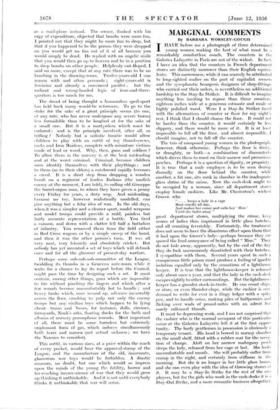MARGINAL COMMENT'S
By BARBARA WORSLEY-GOUGH .1. HAVE before me a photograph of three determined young women making the best Of what must be a remarkably comfortless couch. The counters in the Galeries Lafayette in Paris are not of the widest. . In fact, I have an idea that the counters in French department stores are distinctly narrower than their English equiva- lents. This narrowness, while it can scarcely be attributed to long-sighted malice on the part of capitalist owners and the sycophantic bourgeois designers of shop-fittings who carried out their orders, is nevertheless an "additional hardship to the Stay-In Striker. It is difficult to imagine anything less inviting to repose than those counters, eighteen inches wide at a generous estimate and made of highly polished wood. Were I a Stay-In Striker faced with the alternatives of counter or floor for my night's rest, I think that I should choose the floor. It could not be harder than the counter, it would certainly be less slippery, and there would be more of it. It is at least impossible to fall off the floor, and almost impossible, I should imagine, not to fall off the counter.
The trio of composed young women in the photograph, however, think otherwise. Perhaps the floor is dusty, or draughty, or both—a combination of discomforts which drives them to roost on their narrow and precarious perches. Perhaps it is a question of dignity, or propriety. It is true that a male employee is to be seen dozing dismally on the floor behind the counter, while another, a fat one, sits sunk in slumber in the inadequate glass shrine of the caisse. Now the cash-desk ought to be occupied by a woman, since all department stores employ female cashiers. Like Mr. Chesterton's wicked Grocer. who . . . keeps a lady in a cage
Most cruelly all day, And makes her count and calls her ' Miss ' Until she fades away "
great department stores, multiplying the crime, keep scores of ladies thus imprisoned in little glass hutches, and all counting feverishly. Fortunately, the treatment does not seem to have the disastrous effect upon them that it had upon the Grocer's lady—perhaps because they arc spared the final annoyance of being called " Miss." They do not fade away, apparently, but by the end of the day they do look uncommonly dissatisfied with their hutches. I sympathise with them. Several years spent in such a conspicuous little prison must produce a feeling of ignoble isolation equalled only by the sensations of a lighthouse keeper. It is true that the lighthouse-keeper is released only about once a year, and that the lady in the cash-desk escapes nightly to other surroundings. But the lighthouse- keeper has a grander stock-in-trade. He can count ships, or stars, or even thunder-claps, while the cashier is con- demned to write for ever in a dingy ledger with a spiky pen, and to handle coins, making piles of halfpennies and flicking over wads of pound-notes with an adroit but surely calloused thumb. It must be depressing work, and-I am not surprised that the cashier who is the normal occupant of this particular caisse at the Gaieties Lafayette left it at the first oppor- tunity. The burly gentleman in possession is obviously a temporary tenant. His head is bowed in uneasy slumber on the small shelf, fitted with a rubber mat for the recep- tion of change. Aloft on her narrow mahogany perch sleeps the lady, released from her cage at last. She looks uncomfortable and unsafe. She will probably suffer from cramp in the night, and certainly from stiffness in the morning. But she is no longer in her little glass house, and she can even play with the idea of throwing stones at it. It may be a Stay-In Strike for the rest of the em- ployees, but for the girls who work in the cash-desks it is a Stay-Out Strike, and a more romantic business altogether.






















































 Previous page
Previous page